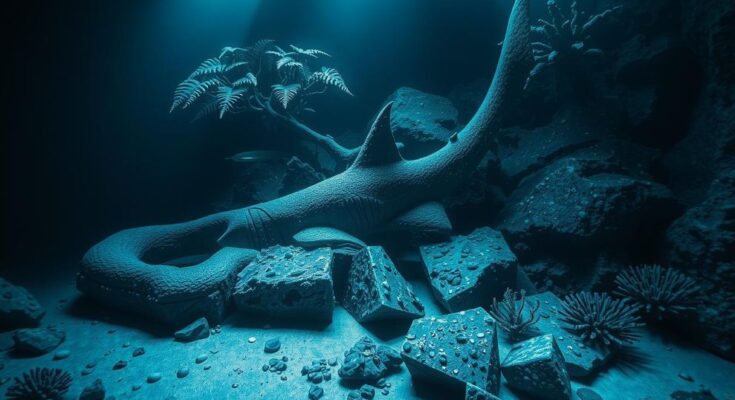Peruvian paleontologists have discovered a 9-million-year-old fossil of an ancient shark believed to be an ancestor of the great white shark, found in the Pisco basin. Exceptional fossilization revealed a nearly complete specimen, with teeth measuring 8.9 centimeters. Analysis showed the shark’s diet consisted mainly of sardines, indicating their importance in the marine predator ecosystem of that era.
Paleontologists in Peru have unveiled a remarkable fossil of a 9-million-year-old shark believed to be a relative of the great white shark. Discovered in the Pisco basin, located 235 kilometers south of Lima, this nearly-complete Cosmopolitodus Hastalis fossil showcases extraordinary preservation. The extinct shark’s teeth measured up to 8.9 centimeters in length, and adults could reach lengths of nearly seven meters, comparable to a small boat.
At a press event, Cesar Augusto Chacaltana, an engineer from the Peruvian geological and mining institute (INGEMMET), referred to the fossil’s “exceptional fossilization.” The fossil was displayed in glass urns, featuring notably a large, sharp-toothed jaw. Mario Urbina, a paleontologist, remarked on the rarity of complete shark fossils, emphasizing the discovery’s importance. Inside the shark’s stomach, remains of numerous sardines were found, indicating these fish were a significant part of its diet.
Urbina explained that anchovies did not exist during the time of this ancient shark, further supporting the idea that sardines primarily sustained marine predators. This discovery highlights Peru’s abundance of fossil finds, as evidenced by a young crocodile fossil presented in November and the skull of a massive river dolphin found last year, both showcasing the rich geological history of the region.
The recent discovery of a 9-million-year-old shark fossil in Peru provides insight into the evolutionary history of marine predators, specifically the lineage leading to modern great white sharks. The Pisco basin, where this fossil was found, is renowned for yielding important marine fossils due to its sedimentary deposits and geological history. The findings also contribute to our understanding of ancient marine ecosystems and dietary habits of these prehistoric creatures.
The unveiling of the Cosmopolitodus Hastalis fossil underscores significant paleontological advancements in Peru, shedding light on the ancestral lineage of the great white shark. With its exceptional preservation and insights into the dietary patterns of ancient sharks, this discovery not only enhances the understanding of marine predator evolution but also highlights the notable fossil bounty of the Pisco region. Continued exploration may yield further insights into the ancient marine life that once thrived in our oceans.
Original Source: www.indiatoday.in




